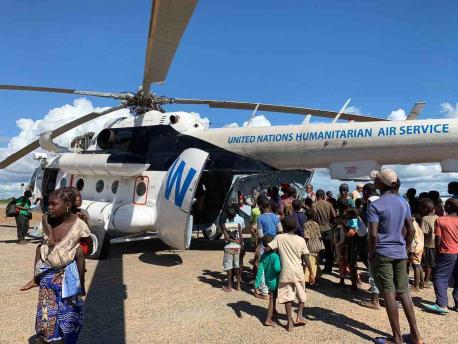
UNICEF Supplies Are On the Ground in Mozambique
43 tons of emergency supplies. That’s how much lifesaving relief UNICEF has packed up and shipped out to help families in Beira, Mozambique, who’ve lost everything to Cyclone Idai.

Speaking to RTÉ News last week, Daniel Timme, spokesman for UNICEF Mozambique, estimated that about 600,000 people could be affected, among them 260,000 children. That number has tripled since then: Estimates now point toward 1.8 million people impacted, roughly 900,000 of them children.
Though UNICEF saw one of its own warehouses damaged in the storm, families are now being reached with medical care, nutrition and water and sanitation supplies. "The first big challenge is access," said Timme. "The most affected area had been cut off for several days, and only recently the airport was opened again — we cannot reach Beira and the surrounding heavily flooded districts, because the roads are blocked."
The cyclone, which made landfall in Mozambique’s Sofala region last Thursday, pounded the area with heavy rain and 106-mph winds. Beira’s 500,000 residents lost power in the storm, which Timme said was more powerful than any the region had experienced in a long time.

The toll on children is devastating. Here, Manuel Jose and his brother, Francisco, stand next to the rubble that used to be their house, which was completely destroyed when Idai made landfall. © UNICEF/UN0291165/de Wet AFP-Services

In Beira, families who've lost their homes, and can't get into the informal settlements that have cropped up, are now living out of suitcases on the streets. © UNICEF/UN0290281/de Wet AFP-Services

Drawing on a 70-year history of being in the right place at the right time, UNICEF and fellow United Nations partner the World Food Program have been moving supplies to help families and children in Beira. Yesterday sacks of food arrived for distribution to shell-shocked residents of the devastated city. In western Mozambique, families are receiving care from UNICEF mobile health care teams, who are treating children for diarrhea and respiratory infections. © WFP Mozambique

UNICEF has set up a staging area at the Samora Michel High School in Beira, which will serve as a distribution point for supplies bound for Beira residents who've lost everything. © UNICEF/UN0291172/de Wet AFP-Services

Anna Francesco (holding her daughter, far left) is the head of her family's household. Standing in front of their home, which was destroyed in the cyclone. Anna, 17, and her siblings have been living in a temporary shelter they built after the storm hit Beira. For families like theirs, the arrival of help and supplies will be a blessed relief. © UNICEF/UN0291170/de Wet AFP-Services
The full extent of the cyclone’s impact in Mozambique, Malawi and Zimbabwe isn't clear. What is certain, though, is that it is utterly devastating.
Photo at top: © WFP Mozambique
HOW TO HELP
There are many ways to make a difference
War, famine, poverty, natural disasters — threats to the world's children keep coming. But UNICEF won't stop working to keep children healthy and safe.
UNICEF works in over 190 countries and territories — more places than any other children's organization. UNICEF has the world's largest humanitarian warehouse and, when disaster strikes, can get supplies almost anywhere within 72 hours. Constantly innovating, always advocating for a better world for children, UNICEF works to ensure that every child can grow up healthy, educated, protected and respected.
Would you like to help give all children the opportunity to reach their full potential? There are many ways to get involved.



